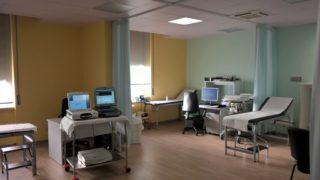Outpatient Implantable Devices Checks

The clinic for the checks of implantable devices (pacemakers, defibrillators, resynchronizers, or implantable loop recorders) takes care of the periodically required instrumental check for these devices. The timing of these checks depends on the type of device and the clinical characteristics of the individual patient, and is generally communicated to the patient from time to time by the doctor or technician who carries out the check. An annual check is usually carried out in the case of a pacemaker and a six-month check in the case of ICD carriers.
Outpatient device check is absolutely non-invasive or painful or dangerous for the patient and does not require any special precautions. The telemetric check takes place by simply placing the head of the dedicated programmer near the implantation site of the device. The interrogation of the device enables the verification of the correct functioning and to optimize the operating parameters of the device, in order to improve the cardiac performance and to verify the presence of arrhythmic episodes.
Almost always before the visit, to check the device, an electrocardiogram is performed at rest, and sometimes even the execution of a dynamic Holter ECG is also recommended. Patients are advised to bring with them all available cardiological documentation and the PM / ICD carrier card at the time of the outpatient check-up.
The devices can be checked privately or in agreement with the NHS. In the event of a visit with the NHS, the patient must request his or her doctor for the ECG and arrhythmological examination for checking and programming the implantable device (PM or ICD).
In our center, in particular for patients with defibrillators and resynchronisers, the devices are also remotely monitored through a transmission device that the patient keeps at home. In the case of patients with remote monitoring, the timing of outpatient checks may be different, as it is possible to carry out less frequent outpatient checks in the case of patients followed with remote monitoring.
